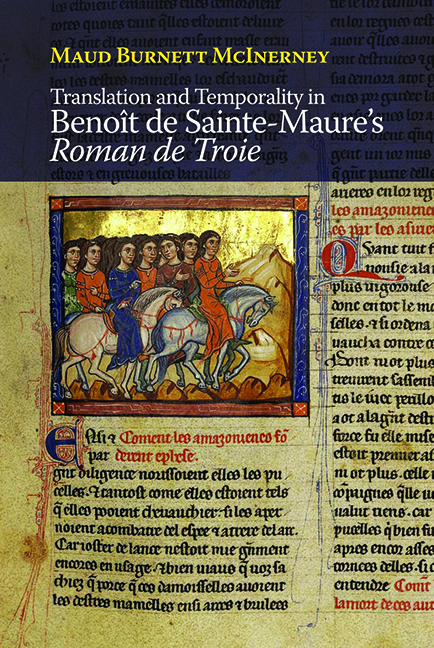Book contents
- Frontmatter
- Dedication
- Contents
- Acknowledgements
- List of Abbreviations
- Introduction: Trojan Time Machines
- 1 A Cupboard in Athens: Translating Troy
- 2 A Very Old Book, or How to Predict the Past
- 3 Ladies’ Time
- 4 Queer Time for Heroes
- 5 Hector in the Alabaster Chamber: Ekphrasis and its Discontents
- Conclusion: Trojan Futurities
- Appendix: The Manuscript Tradition of the Roman de Troie
- Bibliography
- Index
- Gallica
5 - Hector in the Alabaster Chamber: Ekphrasis and its Discontents
Published online by Cambridge University Press: 07 October 2022
- Frontmatter
- Dedication
- Contents
- Acknowledgements
- List of Abbreviations
- Introduction: Trojan Time Machines
- 1 A Cupboard in Athens: Translating Troy
- 2 A Very Old Book, or How to Predict the Past
- 3 Ladies’ Time
- 4 Queer Time for Heroes
- 5 Hector in the Alabaster Chamber: Ekphrasis and its Discontents
- Conclusion: Trojan Futurities
- Appendix: The Manuscript Tradition of the Roman de Troie
- Bibliography
- Index
- Gallica
Summary
I cannot see how in time it will be possible to look at it without making all kinds of mistakes; not so much about what means what or about how it all was done (subtly, Oh quitesubtly enough) but just in thinking that something need be said at all. The riot of silences painted into it, the old badges of meaning, taken from the old books – both may disappear under the raucous, continuing crackle and the hushed scuffings of age.
John Hollander's poem “The Altarpiece Finished” is an ekphrastic meditation on the impossibility of ekphrasis. The poet speaks in the voice of the painter Hubert van Eyck, elder brother of the more famous Jan, who together created the Ghent altarpiece. Hollander evokes the miraculous complexity of a work of art that contains the entire painted world, not only “a great biblical golden talent of invention” in the depiction of God and all his angels and saints, Adam and Eve, Cain and Abel, and a host of other figures from scripture and Church history, but also “a grey pond with five tiny figures gliding | over it” and “a pair of burghers discussing something | underneath the sign of the Ram's Head.” Whether these details can actually be detected within the universe of the van Eycks’ masterpiece matters not at all (looking at the extraordinary high-resolution image developed by the Getty Foundation, I cannot see the pond or the sign of the Ram's head, but I can certainly see pairs of tiny burghers in deep discussion); rather, it is the act of creative imagination involved in the description that is the point and also the problem. Of ekphrastic poems like this, Hollander remarks in an essay, “Because I could never draw or paint, and I loved and remembered and brooded over pictures even in childhood; the only way to make them was to describe (a) actual ones or (b) those which I invented.” The descriptive mode may thus be entirely fictional, even when it attaches itself to a real work of art. At the end of the poem, the speaker links artistic creation to both time and death: “But what is time? something paintings take to finish, or to rot or | To become the way things look in.
- Type
- Chapter
- Information
- Publisher: Boydell & BrewerPrint publication year: 2021



